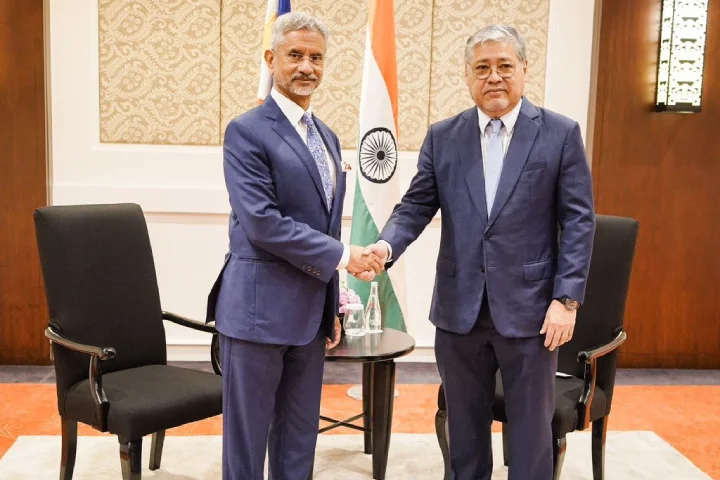External Affairs Minister S. Jaishankar said on Tuesday that India firmly supports the Philippines for upholding its national sovereignty after the latter lodged “strongest protest” against Chinese action in the disputed South China Sea.
The Philippines summoned a Chinese diplomat on Monday, following a “water cannon assault” by the country’s coast guard that injured Filipino navymen and heavily damaged their boat last week.
Addressing a press briefing in the capital alongside Enrique Manalo, Secretary for Foreign Affairs, S. Jaishankar extended his support to the nation, and called on all countries to uphold the United Nations Convention on the Law of the Sea (UNCLOS).
“As a nation deeply invested in this region (The Philippines), because of its Act East policy and Indo Pacific…, India follows all developments with great interest. We are also convinced that the progress and prosperity of this region is best served by staunch adherence to the rules-based order,” he said.
Stating that all parties must adhere to UNCLOS 1982 in its entirety, both in letter and in spirit, he said: “I take this opportunity to firmly reiterate India’s support to the Philippines for upholding its national sovereignty.”
There have been repeated confrontations between Manila and Beijing in recent months owing to their long history of maritime territorial disputes in the South China Sea.
Following Manila’s protest, China described its actions as “lawful regulation, interception and expulsion” of a foreign vessel that “tried to forcefully intrude” into Chinese waters.
UNCLOS establishes the international legal order of the seas and oceans.
India has been supporting freedom of navigation and over flight, and unimpeded commerce based on the principles of international law, reflected notably in the UNCLOS 1982.
The two leaders discussed shared interest in ensuring maritime safety, given that the two nations contribute so much to the global shipping industry.
As two seafaring nations of the Indo-Pacific, the EAM said that bilateral maritime cooperation holds great potential as he highlighted that the two nations signed agreements on enhanced maritime cooperation last year.
He also briefed his Filipino counterpart about the Indian Navy’s deployments of the Red Sea and the Arabian Sea to counter ongoing threats.
The EAM emphasised that India’s partnership with the Philippines also has a larger context in terms of engagement with the ASEAN as the Southeast Asian nation will take over as New Delhi’s country coordinator later this year.
“We look forward to its steering India-ASEAN cooperation, especially in regard to reviewing the trade agreement, to building connectivity and to deepening people-to-people contacts.”
Further, the Minister stressed that as the world changes, it is essential for countries like India and the Philippines to cooperate more closely to shape the emerging order.
Keeping this in mind, the two nations discussed a range of global and regional issues, ranging from the United Nations, Non-Aligned Movement (NAM), Indo-Pacific to Myanmar and Ukraine.
“These convergences based on expanding bilateral partnerships today drive the upward trajectory of our ties,” Dr Jaishankar said.
The Minister has embarked on a three-nation tour to Singapore, the Philippines and Malaysia, from March 23 – 27, to strengthen bilateral relations.
In June 2023, EAM Jaishankar and Manalo co-chaired the fifth meeting of the Joint Commission on Bilateral Cooperation at Hyderabad House in New Delhi.
The two leaders held wide-ranging and substantive discussions on regional and international issues of mutual concern, according to an MEA release.
Acknowledging that both countries have a shared interest in a free, open, and inclusive Indo-Pacific region, the two nations underlined the need for peaceful settlement of disputes and adherence to international laws.




















